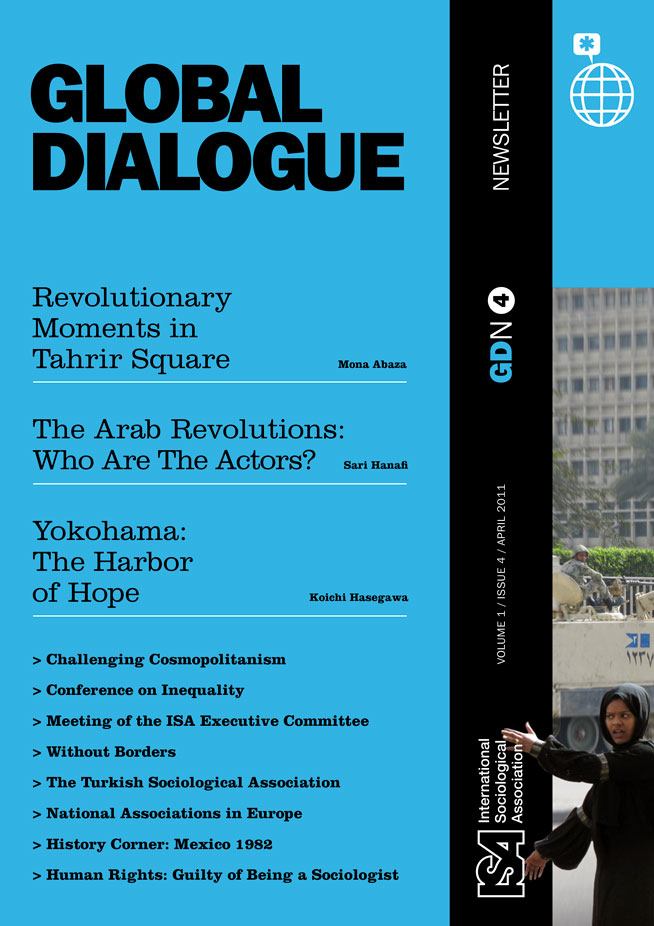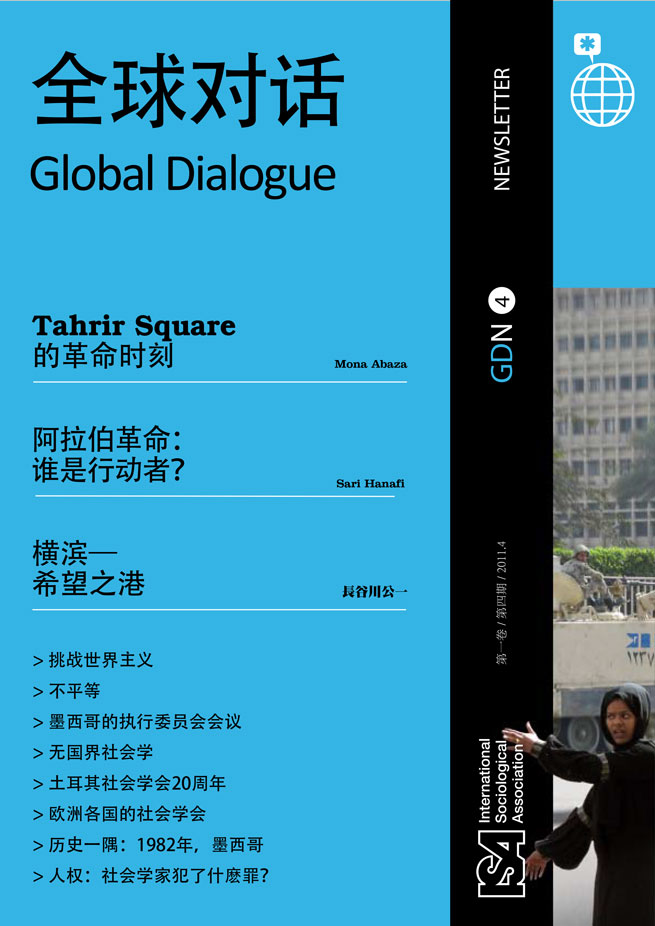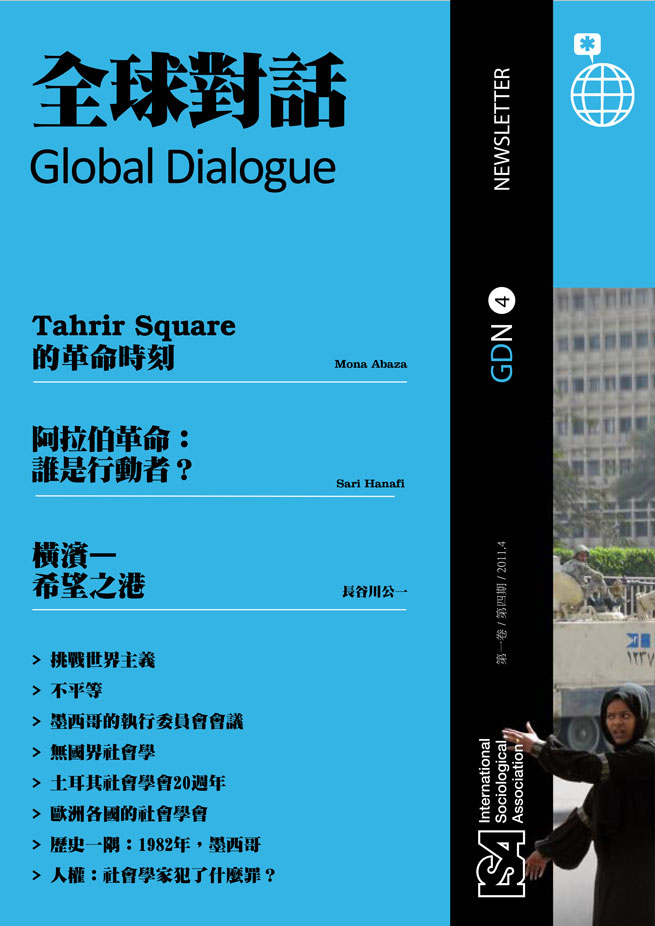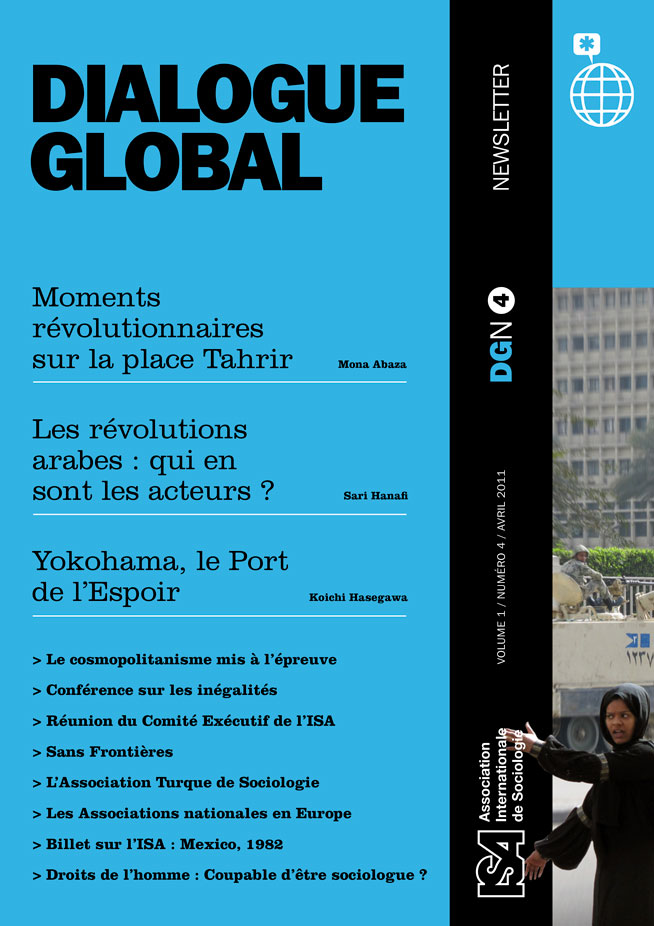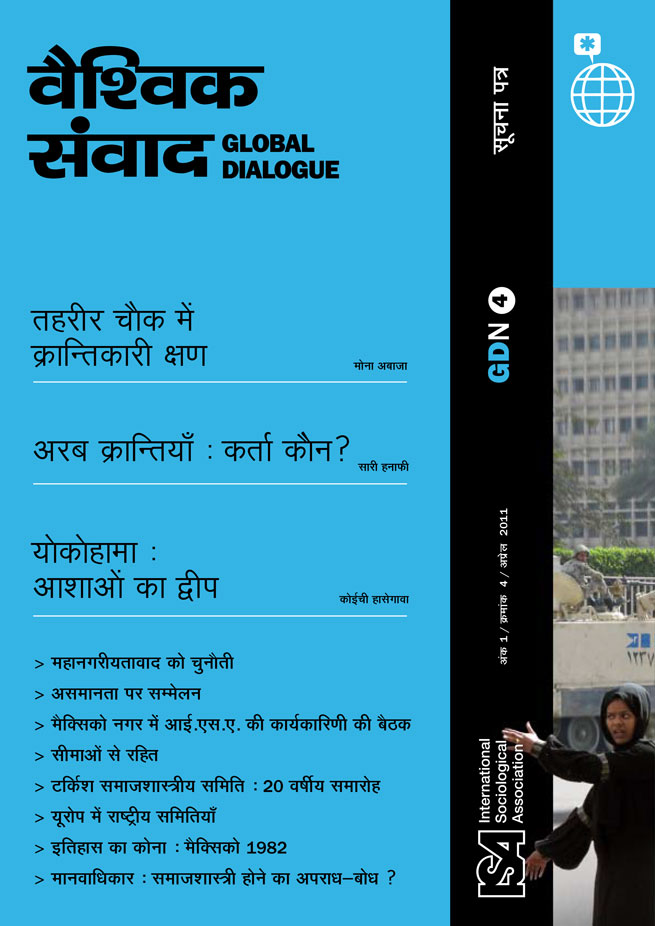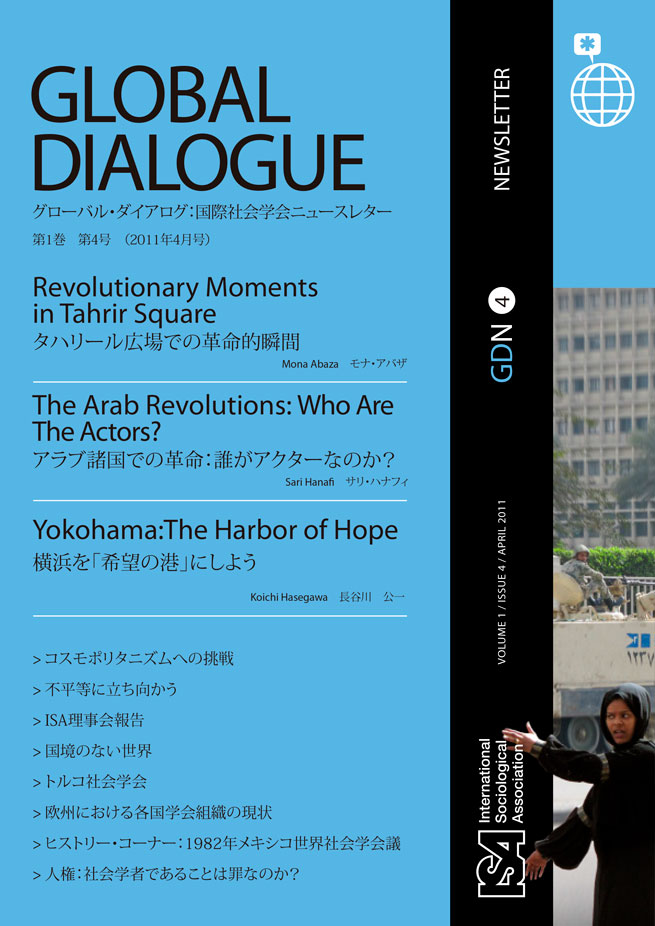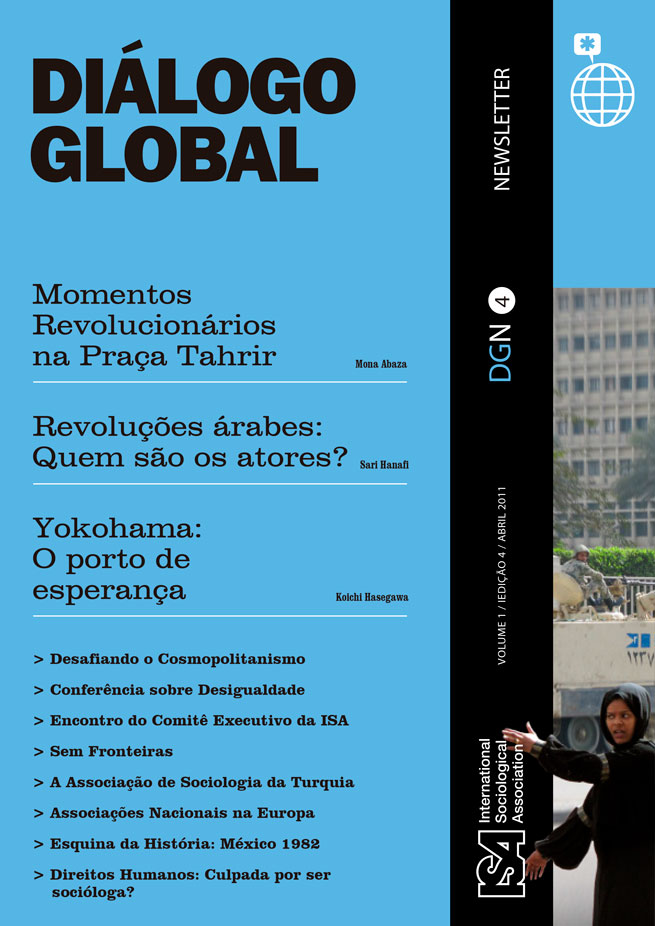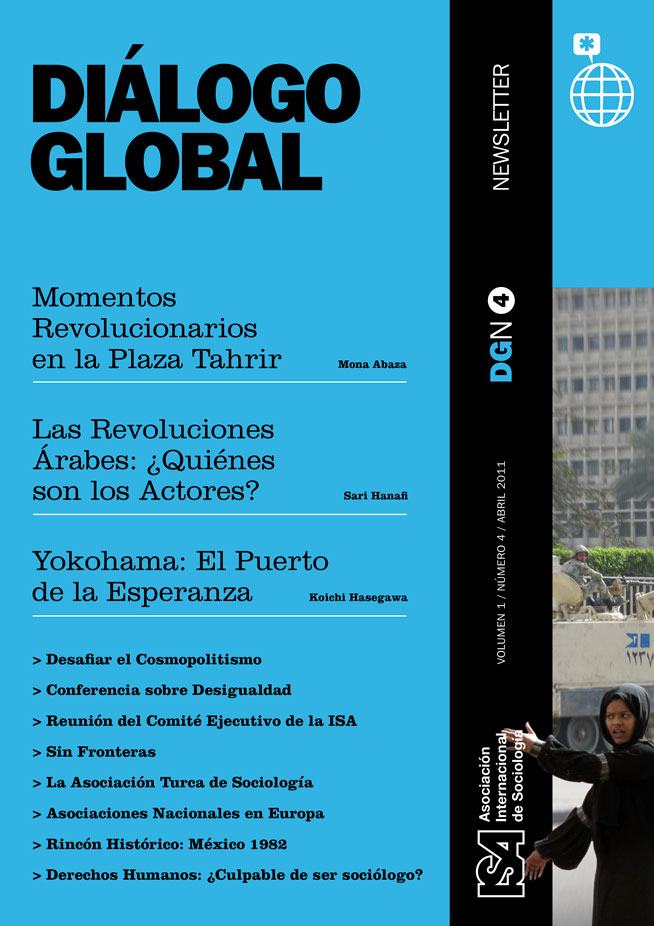Read more about Debate

Conference on Inequality
by Raquel Sosa Elízaga
May 07, 2011
Global Dialogue has initiated an interesting debate regarding international sociology. My intervention is directed to Ulrich Beck’s two contributions on the theme of ‘the cosmopolitan turn’ (Global Dialogue 1.2 and 1.3) and also alludes to the comments made on this subject by Raewyn Connell (Global Dialogue 1.2). This comment restricts itself to three ideas: methodological cosmopolitanism, methodological nationalism and global sociology.
Cosmopolitanism, as Craig Calhoun says, is in fashion. Instead of elaborating its various meanings and trajectories, I use it in its common understanding – the recognition of the ‘other’ in all its forms, or to put it more evocatively, as the editorial of the 2000 issue of Public Culture does: “in its wide and wavering nets” it “catches something of our need to ground our sense of mutuality in conditions of mutuality…”. Surely only when we recognize this mutuality and difference, is it possible to combine what Beck states are the “contradictory perspectives (Northern and Southern) systematically on the level of sociological analysis”.
My question is: Why does Beck’s methodological cosmopolitanism not recognize one of the most significant experiences of sociological scholarship in the various regions of the south? This has not only been discussed by Connell in her book, Southern Theory, but it has also been elaborated by many scholars from the Global South. It has been termed and identified as academic dependency and its manifestations have been explored within teaching and learning processes, in the curriculum, in the processes of research, in the formulation of criteria adopted for accepting articles for journals and books, and ultimately in defining where one publishes and what is academic excellence.
What are the reasons for the continuing prevalence of these academic dependencies? The answers are many and it starts with the explorations of the relationship between colonialism and its forms of knowledge. However, its prevalence in the form of the ‘captive mind’ syndrome (in the words of Syed Hussein Alatas), even after the formal demise of colonialism, has led many to explore the theories regarding modernity and thus sociology. Scholars have argued that European and North American sociological theories are ethnocentric and that its Eurocentric episteme has constrained the developments of a genuinely inclusive discipline that may be termed ‘cosmopolitan’.
A Eurocentric imagination understands itself in terms of its own self image. This self saw its growth located in European Enlightenment which created a new rationalist and humanist subject. With reason and science, this subject conquered time and space, thereby ensuring and fulfilling the demands of human progress. Instead of perceiving modernity as a world economic system (a capitalist production system together with its market), sustained by a political formation (a system of nation-states, each legitimated through law), a social organization (in the form of classes, gender, races, ethnicities) together with cultural practices (such as leisure, good life), the Eurocentric imagination reified it to mean, as Arif Dirlik argues, a ‘culturalist’ process internal to Europe. This self emerged not only in terms of its own endogenous development but also in and through the organization of colonial and imperialist processes of domination. However, European scholars have evaluated and continue to evaluate this discourse not in its mutual relationship with colonialism, but within the confines of its own endogenous history and its language. This orientation continues today to explain the processes of high, radical or second modernity within Europe and North America and organizes the discussion of methodological nationalism.
Methodological nationalism
Critical to the theory of methodological nationalism are two concepts, that of space and place. Theorists have tried to keep these analytically separate, but oftentimes there is a conceptual fuzziness in their use. Most often space is understood as an abstract discourse of enumerating social interrelations, while place is perceived to be the physical location where it is actualized – places are produced in terms of a mix of social relations. Over time, these places ‘stretch out’ and identify themselves in terms of a ‘consciousness’ and associated symbolic meanings (such as in case of a city, Buenos Aires or a nation-state, South Africa). And in turn, these identities allow solidarities to be constructed against other places/territories, such as the national (Singapore against Malaysia) and supranational (Indonesia against Holland) by utilizing bonds and solidarities of ‘local’ places (Tahrir Square).
Methodological nationalism confuses the complex articulation between space and place when it argues that the conceptions of the nation, nationality and nationalism have impinged only negatively on the framing of social sciences (both in the way theories were organized and methodologies and methods were implemented). It may have done so in the colonizing imperial countries, such as France and Germany where the ‘founders’ of sociology elaborated the disciplines’ canons, but this contention cannot be accepted for the entire world. For, nation and nationalism have also positively implicated themselves in discourses in ex-colonial countries, such as India. An examination of the history of the discipline of sociology in India allows us to understand these complexities.
Social science, when it developed in India, used a nationalist conception to question colonialism’s use of anthropological theories and methodologies to structure a discourse of ‘Indian’ society as a non-modern society. The growth of nationalist ideologies, in the pre-independence phase and later, allowed for an interrogation of received colonial knowledge that assessed ‘Indian society’ from the ‘outside’, asserting a need to study it from the ‘inside’, thereby facilitating the creation of a sociological language in debate with theories developed within European sociology. With the initiation of a nationalist modernist project, that used higher education for creating opportunities for mobility, these nationalist-oriented social sciences came to play a critical role in conceptualizing planned social change and development.
Thus, in the case of India, as in other ex-colonial countries, methodological nationalism was a self-conscious embrace of a place/territory to create a set of guidelines to confront colonial discourses of social sciences. Identification with the ‘place’ allowed ‘national’ intellectuals to build intellectual solidarity against dominant colonial knowledge. Second, the recognition of this place-bound solidarity facilitated the growth of an ‘alternate’ discourse. This then became the principle for organizing the institutionalization of knowledge systems through a gamut of policies and regulations. These policies determined the protocols and practices of teaching and learning processes, establishment and practices of research within research institutes, distribution of grants for research, language of reflection, organization of the profession and definitions of scholars and scholarship.
This genealogy needs to be highlighted and valued in juxtaposition of the negativities outlined in the debate of methodological nationalism. Rather than restricting an understanding of international sociology, nationalist sociologies from ex-colonial countries have enlarged it. On the one hand, these have asserted alternate ways of assessing contextual processes thereby underlining the many particularities that have structured the world and on the other, have highlighted the inequalities that structures international sociology. This heritage has relevance today and cannot be wished away.
This is not to assert that the reduction of ‘society’ to place/territory (as defined by the nation-state) within nationalist sociologies of the ex-colonial countries, has not created methodological problems. It is clear that these sociologies have made invisible and/or discounted the place-bound voices and experiences of the ‘local’ ‘weak’, and the ‘marginal’ subalterns. If sociologies of the end of the 20th century questioned the supranational, it also dominated and universalized its own infra-local. The moot question is: what kinds of frames are needed to create an international sociology that can include in its analysis these conflictual and contradictory processes of dominance-subordination that have organized its differential epistemes and silenced the many others in the world?
Global sociology?
I am with Beck when he asks, “how can social and political theory be opened up, theoretically, empirically as well as methodologically and normatively, to historically new, entangled modernities which threaten their own foundations? ” We may debate whether ‘entangled modernities’ is the correct categorization to use in order to examine the interconnected world capitalist system that was structured in uneven and combined processes, since the 15th century till today. But it is clear that we need to move on and away from the representations that have organized its discourse (as in sociology) from the 18th century onwards in terms of the binaries of the universal (Eurocentric)/particular (ex-colonial and national). Simultaneously, we have to ensure that when we do this, we do not use a universal episteme that once again creates a ‘captive’ mind, both in the words and language we use and their meanings.
Unfortunately the terms ‘cosmopolitan’/’cosmopolitanism’ and ‘global’ have had a long history within European modernities and remain overburdened with these histories and thus their meanings. I have thus preferred to use ‘diversities’, because in many languages, including English, its usage has been multivariate and its meanings range from a simple assertion of difference to an elaboration of an ontological theory of difference that recognizes power as a central concept in the creation of epistemes. Symbolically it also implies a dispersal rather than homogenization. Also, in its effects (as an ontological theory), its usage allows these epistemes not to be placed in a single line and considered equal in terms of each other. Rather these remain in various mutual relations with each other and in turn are organised by conditions of their own mutuality. These conditions are structured by various levels of space/place dynamics within a matrix of power. Individually these are neither superior nor inferior and collectively these remain distinct, various, universal but interconnected. They present and define their own theories to assess their distinct and different perspectives of sociologies and its theories and practices.
The challenge today is to create this language and the intellectual infrastructure that can recognize this matrix of power when it promotes the many voices of sociological traditions.
Sujata Patel, University of Hyderabad, India
This issue is not available yet in this language.
Request to be notified when the issue is available in your language.
If you prefer, you can access previous issues available in your language:

